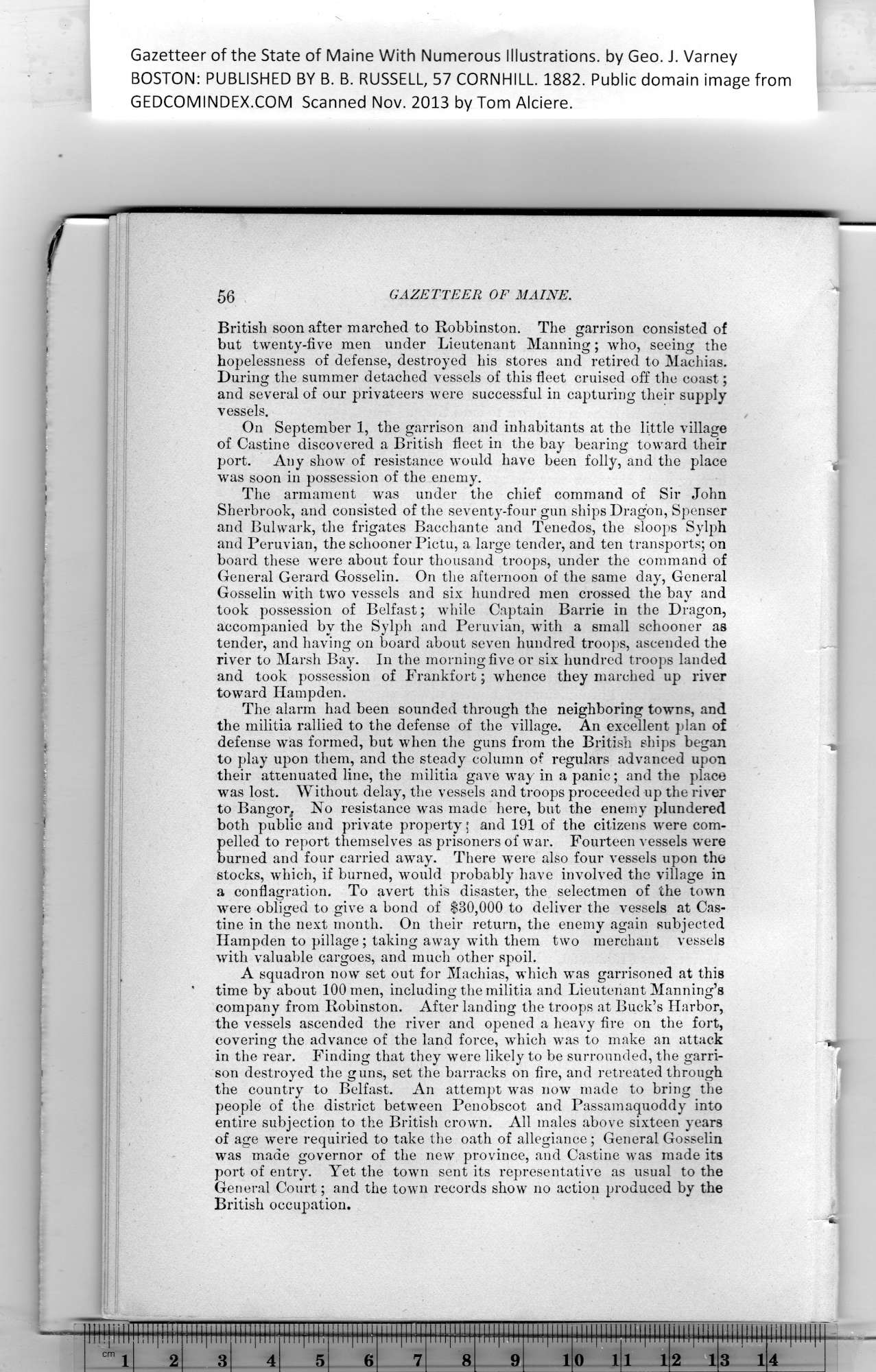|
Gazetteer of the State of Maine With Numerous Illustrations, by Geo. J. Varney
BOSTON: PUBLISHED BY B. B. RUSSELL, 57 CORNHILL. 1882. Public domain image from
56 GAZETTEER OF MAINE.
British soon after marched to Robbinston. The garrison consisted of
but twenty-five men under Lieutenant Manning; who, seeing the
hopelessness of defense, destroyed his stores and retired to Machias.
During the summer detached vessels of this fleet cruised off the coast;
and several of our privateers were successful in capturing their supply
vessels.
On September 1, the garrison and inhabitants at the little village
of Castine discovered a British fleet in the bay bearing toward their
port. Any show of resistance would have been folly, and the place
was soon in possession of the enemy.
The armament was under the chief command of Sir John
Sherbrook, and consisted of tbe seventy-four gun ships Dragon, Spenser
and Bulwark, the frigates Bacchante and Tenedos, the sloops Sylph
and Peruvian, the schooner Pictu, a large tender, and ten transports; on
board these were about four thousand troops, under the command of
General Gerard Gosselin. On tbe afternoon of the same day, General
Gosselin with two vessels and six hundred men crossed the bay and
took possession of Belfast; while Captain Barrie in the Dragon,
accompanied by the Sylph and Peruvian, with a small schooner as
tender, and having on board about seven hundred troops, ascended the
river to Marsh Bay. In the morning five or six hundred troops landed
and took possession of Frankfort; whence they marched up river
toward Hampden.
The alarm had been sounded through the neighboring towns, and
the militia rallied to the defense of the village. An excellent plan of
defense was formed, but when the guns from the British ships began
to play upon them, and the steady column of regulars advanced upon
their attenuated line, the militia gave way in a panic; and the place
was lost. Without delay, the vessels and troops proceeded up the river
to Bangor, No resistance was made here, but the enemy plundered
both public and private property; and 191 of the citizens w'ere com-
pelled to report themselves as prisoners of war. Fourteen vessels were
burned and four carried away. There were also four vessels upon the
stocks, which, if burned, would probably liave involved the village in
a conflagration. To avert this disaster, the selectmen of the town
were obliged to give a bond of $30,000 to deliver the vessels at Cas-
tine in the next month. On their return, the enemy again subjected
Hampden to pillage; taking away with them two merchant vessels
with valuable cargoes, and much other spoil.
A squadron now set out for Machias, which was garrisoned at this
time by about 100 men, including the militia and Lieutenant Manning’s
company from Robinston. After landing the troops at Buck’s Harbor,
the vessels ascended the river and opened a heavy fire on the fort,
covering the advance of the land force, which was to make an attack
in the rear. Finding that they were likely to be surrounded, the garri-
son destroyed the guns, set the barracks on fire, and retreated through
the country to Belfast. An attempt was now made to bring the
people of the district between Penobscot and Passamaquoddy into
entire subjection to the British crown. All males above sixteen years
of age were requiried to take the oath of allegiance ; General Gosselin
was made governor of the new province, and Castine was made its
port of entry. Yet the town sent its representative as usual to the
General Court; and the towTn records show no action produced by the
British occupation.
PREVIOUS PAGE ... NEXT PAGE
This page was written in HTML using a program written in Python 3.2
|
